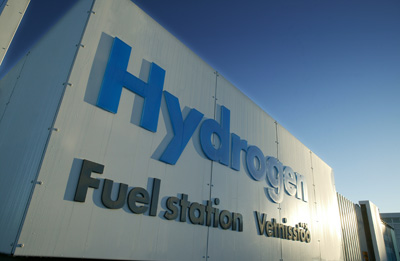At the L.A. Auto Show this year, both Honda and Hyundai unveiled fuel-cell electric vehicles as they pledged to produce and sell a green car, a goal that has not yet been fruitfully realized in the auto market. The debuts accompanied Toyota’s introduction of their concept fuel-cell eletric vehicle (FCEV) at the Tokyo Auto Show.
These cars, which make electricity from a reaction between hydrogen and oxygen, do not emit any greenhouse gases. Hyundai executives said that when looking at a life-cycle analysis, they are cleaner than “any other power train vehicle,” including battery electric cars.
At the Honda debut, Tetsuo Iwamura, president and CEO of American Honda Motor Co., said that its FCEV “has the potential to become the ultimate solution to realizing ultra-low carbon mobility. Using renewable energy sources such as solar, wind, water, biofuel … the fuel cell has tremendous potential for zero-emissions mobility.” Fuel cells are supposedly more adaptable when it comes to developing uses and can even be used in high performance vehicles.
But FCEVs have been difficult to move to mass production because there aren’t many fueling stations and to redesign the entire country for one type of vehicle would take an extremely long time. Hyundai will sell its car initially only in Southern California, and then later in Northern California. It plans to “pre-screen” customers to make sure they have access to a fueling station. Hyundai and Honda see the potential for the FCEV market to grow in California because of moves regarding green energy by the Golden State. In October, Gov. Jerry Brown (D) signed legislation committing the state to spend $20 million annually by developing hydrogen stations until 100 exist. Money for the program will come from state motorists through surcharges they pay on state vehicle registrations, new tire purchases and smog checks. The state said it was necessary to accelerate the development of these FCEVs. However, manufacturers will not put a lot of effort into building these cars until there is a strong customer base and, in consequence, fueling stations.
The car manufacturers’ simultaneous debuts of the fuel-cell vehicles weren’t a coincidence. Toyota, Honda, Hyundai and several other car manufacturers earlier this year signed a pact to produce a “substantial number” of hydrogen fuel cell cars to market by 2017. This was in response to a huge amount of money being removed from the development budget by the Department of Energy.
Perhaps in the next few years, we will see positive results from the initial introduction of FCEVs to the public and this leg of the auto industry will have something to stand on.



